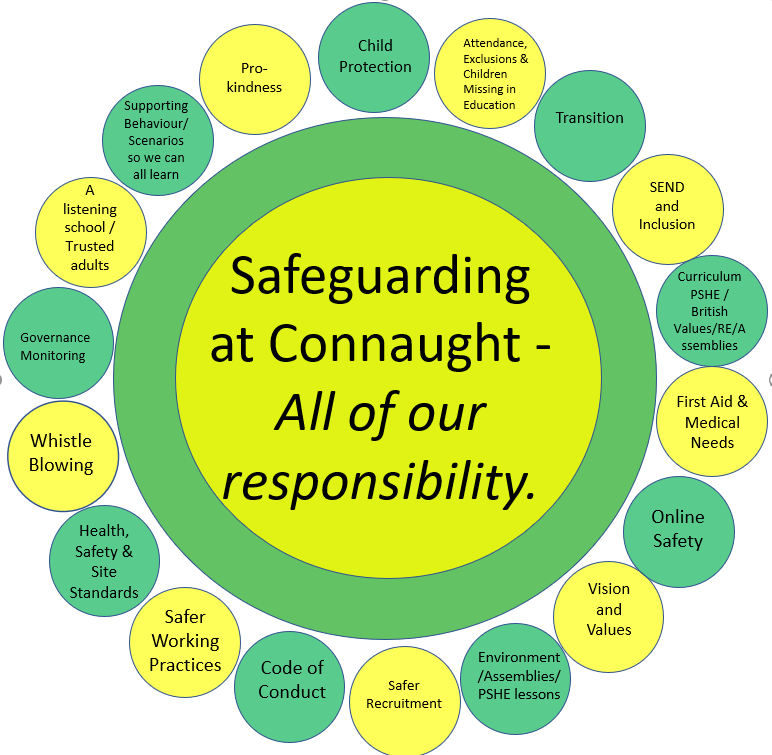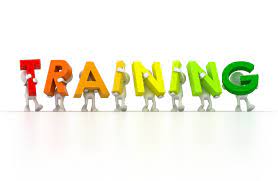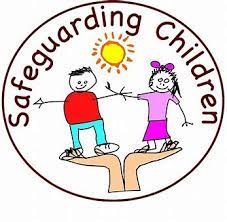Safeguarding
Safeguarding at Connaught
At Connaught Junior School, we understand that safeguarding is everyone’s responsibility. Through our training, all staff are aware that a safeguarding incident could happen here. All members of staff, including teaching, support staff and club providers, receive annual safeguarding training either at Connaught Junior School or through their own organisation.
This overview covers all the statutory areas as detailed in the DFE document, ‘Keeping Children Safe in Education‘ (updated September 2024) – including the Prevent Strategy, FGM and Child Sexual Exploitation.
Mrs Charlotte Sweeney-Gillings is our Designated Safeguarding Lead (DSL) having received all of the required training. She also attends regular training to keep up to date with any issues relating to child protection and safeguarding. Additional weekly updates are received from Andrew Hall, a specialist safeguarding consultant and the NSPCC. These are then disseminated to relevant members of staff. Any training updates that staff may require will be delivered by the DSL. Connaught has incredibly tight procedures, which have been audited and approved by external providers, ensuring that our children and staff are safe. We work with an array of agencies including Children’s Services, Family support, the School Nurse and the Police. Miss Whiting, Miss McGann and Mr Stevens are the Deputy DSLs and support Mrs Sweeney-Gillings in the leadership and management of Safeguarding.
OFSTED 2023 quote
'Safeguarding is a strength of the school. Leaders are resolute in their determination to ensure that safeguarding procedures are robustly followed to help keep pupils safe from harm. Leaders provide high-quality extensive training. This ensures that staff know how to identify pupils who may be at risk of harm or need help. Pupils are taught about risks, how to keep themselves safe and how to get help. Leaders are relentless in their pursuit of ensuring support for pupils who need it. They work swiftly to provide the required help through the school or in partnership with outside agencies.'
Family Support Worker
We have a TAMAT Family Support Worker who works across the trust to support our community. She has received all of the necessary training and works with other school Family Support workers ensuring that her knowledge is up to date. We are very lucky to have this support across our schools.
Pupils safeguarding support
Leaders are proactive in making sure that pupils know how to keep themselves safe. They are alert to current risks and know their pupils well. They work closely with parents on topics such as online safety and mental health.
Each week, the children have an assembly which focusses on a safeguarding theme. This enables the children to understand safe and unsafe situations both in and out of school. As well as this, the children are presented with a real-life scenario which they have the chance to discuss and respond to.
Outside agencies are invited into school to speak to the children about themes such as different types of abuse, situation danger, road and cycle safety and online safety. We also use the NSPCC tools to education our children about speaking out.

Governors
The 'Safeguarding governors' ensure an effective understanding of safeguarding and how it's implemented within a school setting. They understand both the requirements and the government legislation.
The Governors at Connaught Junior School who monitor safeguarding are Fiona Torley and Hannah Taylor.
- The governors responsible for ensuring that the school’s safeguarding policies, procedures and training are always effective and comply with the law. The governing board has a strategic leadership responsibility for the school’s safeguarding arrangements, ensuring that they comply with their duties under legislation.
- The safeguarding governors ensure that the DSL (Mrs Sweeney-Gillings) takes leadership responsibility for the school’s safeguarding arrangements.
- The governors have relevant and up-to-date knowledge and experience of safeguarding at Connaught and has access to the appropriate training.
- The child protection and safeguarding governors (Fiona Torley and Hannah Taylor) develop and maintain an awareness of safeguarding policies and processes in the school on behalf of the governing board, ensuring that Connaught develops and maintains a culture of ‘it could happen here’, and be certain that all staff understand their responsibilities relating to safeguarding pupils and reporting concerns.
- The 'Safeguarding Governors' act as a link between the governing board, headteacher and DSL, reporting back to the board on their monitoring activities and the school’s compliance with KCSIE which occurs in termly Governor meetings.
- In the termly monitoring that the governors complete, they fill out a Portfolio Report which is shared with the Headteacher and Governors. In this report they monitor:
- Staff Understanding of Safeguarding
- Children's understanding of keeping safe
- Picture of safeguarding across the academy
- Behaviour
- Health and Safety
- During these meetings, the governors offer challenge and support resulting in safeguarding being of high quality.
Training

Within our school, training is delivered regularly to ensure all of our staff have the most up-to-date information and knowledge to ensure our children are safe. Training is not only provided for our staff but also our volunteers who visit our school regularly.
Staff Training
At the beginning of each academic year, all staff complete safeguarding training with the DSL covering all aspects of safeguarding. Safeguarding training breaks down the appropriate courses of action to take, empowering staff by giving them the skills and knowledge they need in order to appropriately report abuse and neglect. As well as this, they have to read the following documents:
- Keeping Children Safe in Education 2024 - https://www.gov.uk/government/publications/keeping-children-safe-in-education--2
- The Safeguarding Policy
- Working together to safeguard children
- What to do you if you are worried a child is being abused
- Staff Code of Conduct
- Whistle Blowing Policy
- E-Safety Policy
- Staff Acceptable Use Policy
- Behaviour Policy
Each week, the staff receive a 7-minute briefing training video enabling staff to constantly be up-to-date with changes to safeguarding. These briefings cover topics such as: mental health / domestic violence / police searches / sexual violence and sexual harassment / county lines / child criminal exploitation to name a few. As well as this, the staff have scenarios that they reflect on enabling them to think about how they might respond and then be given the correct response.
Recruitment Procedures
'Safeguarding is a strength of the school. Leaders are resolute in their determination to ensure that safeguarding procedures are robustly followed to help keep pupils safe from harm.' OFSTED 2023
Connaught adheres to the Safer Recruitment directive and members of the SLT and governors have completed regular safer recruitment training. All members of our school staff have an enhanced DBS (Disclosure and Barring Service) check in order to be able to work within school. This is regardless of the employee’s role. Teachers, classroom assistants, admin staff, cleaners and caterers must all be checked.
Additionally, all volunteers and anyone else who has regular contact with our children are checked too. DBS certificates are documented on our Single Central Record, a legal requirement, which is checked and signed off on a regular basis by a safeguarding governor, an Ofsted precondition. Visitors to the school must either provide their own DBS on arrival, or be a member of a professional body who routinely DBS check their employees or associates. These include OFSTED inspectors and Local Authority staff. Any one-off visitor, should provide their own DBS. All visitors and volunteers are required to read Connaught’s safeguarding procedures and those without a DBS, to be accompanied by a member of staff at all times during their visit.
Parent volunteers go through similar safer recruitment checks to that of staff including completing an application form, having an interview, gathering references, completing safeguarding training and an induction to our school.
Awareness of our policies also applies to parents who make themselves available to go on school trips or provide lifts to sporting/cultural events. All visitors to the school must ‘sign-in’ at reception and be given a visitors badge for ease of identification by members of staff. Parents who wish to assist in school are interviewed by a member of the Senior Leadership Team (SLT), using the same Safer Recruitment criteria as applied to permanent staff. They are also required to receive safeguarding training which is delivered by the DSL.
All external club providers must provide proof that they also adhere to Safer Recruitment and DBS checking.
Risk Assessments
All areas of Connaught’s site undergo a biannual risk assessment by the school’s qualified risk assessor. This means that whist we cannot remove risk, we can demonstrate that we have looked at ways of minimising that risk. These risk assessments are undertaken on areas such as classrooms, halls, the playground and the car park. Our SLT, Heads of Year and teachers carry out risk assessments for all school trips, including our annual Year 6 residential stays. These are in accordance with Surrey CC guidelines.
Security
Access to the campus, both for vehicles and pedestrians, is via security gates with a video link to the office. Staff have access to the gates by key fob. Visitors can only gain access by gate release authorised by Office staff. Access to the external doors where we have classrooms are by a key fob. All fire exits are either twist lock or bar push exits. Additional locks have been added to main entry doors for use in the event of a ‘lock-down’. Partial and full lock-downs are practised in accordance with the Connaught Lock-Down/Sheltering in Place Policy document.
Equality
The school has an Equality policy that monitors any possible discrimination in the school in relation to any of the nine protected characteristics (Equality Act 2010). The School also makes annual returns on any racist incidents.
Childrens' Support

Regular dialogue with pupils in class or assemblies, educate and enforce safeguarding. Children know who they can go to as ‘trusted adults’, should they have any worries or concerns. Every week the children are presented with a scenario enabling them to reflect on how they would manage different situations. Examples are:
- You are in the playground and a friend shares something with you that makes you feel uncomfortable. What are the risks, and what do you do?
- In class a friend tells you that they have been on a website and seen something which they know they shouldn't have seen, They are now worrying about it. What are the risks, and what do you do?
- On the way to school, you see a peer walking the wrong way away from school, and they are crying. They are by themselves. What are the risks, and what do you do?
- You are on a group chat with your friends and someone is being very unkind to someone else. What are the risks, and what do you do?
Each week, the children have an assembly about different topics including
| Spring | Theme |
|---|---|
|
Stranger Danger Online Safety Being a bystander Road Safety Safer Internet Day Young Carers
|
|
|
|
Outside agencies are invited to come into school to talk about safety issues relevant to this area:
- Road safety
- Rail Safety
- Personal safety
- Young Carers
- The School Nurse
- Bike Safety - During the course of years 4 and 5, pupils have the opportunity to participate in Surrey CC’s ‘Bikeability’ courses to learn good practise when on the roads.
- We also use NSPCC assemblies to teach the children about how to keep themselves safe
- We have also shared the Pantosaurus video with the children reminding them how to keep themselves safe.
-
Useful links for parents/carers
Each term, a safeguarding newsletter/online safety letter is sent out to parents to ensure that they are also kept up to date with how to ensure they are keeping their children safe. Below are some useful links for our parents/carers to access.
Keeping children safe during community activities, after-school clubs and tuition: Questions to help parents and carers choose out-of-school settings https://www.gov.uk/government/publications/guidance-for-parents-and-carers-on-safeguarding-children-in-out-of-school-settings/keeping-children-safe-during-community-activities-after-school-clubs-and-tuition-questions-to-help-parents-and-carers-choose-out-of-school-settings
Surrey Safeguarding Children Partnership (SSCP) aims to support professionals, parents, and carers in keeping children safe and to provide advice and support on a wide range of topics.
https://www.surreyscp.org.uk/parents-carers/
Child line - https://www.childline.org.uk/
Keeping children safe online -
https://www.nspcc.org.uk/keeping-children-safe/online-safety/
https://saferinternet.org.uk/guide-and-resource/parents-and-carers
https://www.thinkuknow.co.uk/parents/
https://www.internetmatters.org/schools-esafety/parent-online-support-pack-teachers/
Reporting concerns
If you have a Safeguarding Concern about any of our children, then please contact the Safeguarding Team by emailing dsl@cjs.tamat.org.uk
Alternatively, you can contact children's services by clicking on the following link:
https://www.surreycc.gov.uk/children/contact-childrens-services
Andrew Hall Updates
Stranger danger - Situation danger
Information from Andrew Hall - 'Stranger Danger' is a phrase that almost everyone in the UK has heard at least once. Either whilst they were in education, or in one's capacity as a parent. The words rhyme, they are easy to remember and meet an intuitive criteria which makes its implementation easy. An important qualifier for giving advice to young children. Given its prior effectiveness, it is important to raise the question as to why it was changed. Why do we no longer teach this doctrine as the primary defence against child abuse? Below are some key takeaways from healthnews.com
-
The phrase “stranger danger” is lacking when it comes to teaching kids about safety.
-
It is better to teach children about dangerous situations.
-
Teach children age-appropriate safety strategies to avoid causing fear.
-
There are great resources that show parents exactly what to say when teaching safety.
-
It is important to know the top 5 tricks that are used to lure children.
-
Parents can teach about safety without causing their children anxiety or stress.
Hanni and The Magic Window - ChildNet
Helping young children in difficult situations to seek support has always been hard. Their minds are often not developed enough to understand bad situations. They are also unable to comprehend what they need to do to get out of them. More often than not their limited vocabulary will also reduce their ability to talk to adults effectively. ChildNet has released a downloadable story over on their site, aimed at children aged three and up. Their objective is to make them aware of how to seek help. By following the link below you can also find simplified resources around the story, as well as the story itself.
https://www.childnet.com/resources/hanni-and-the-magic-window/



